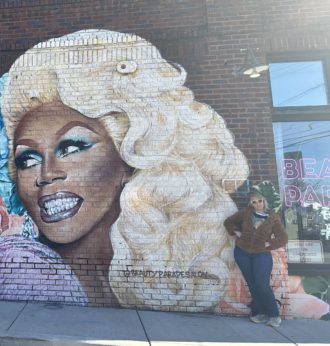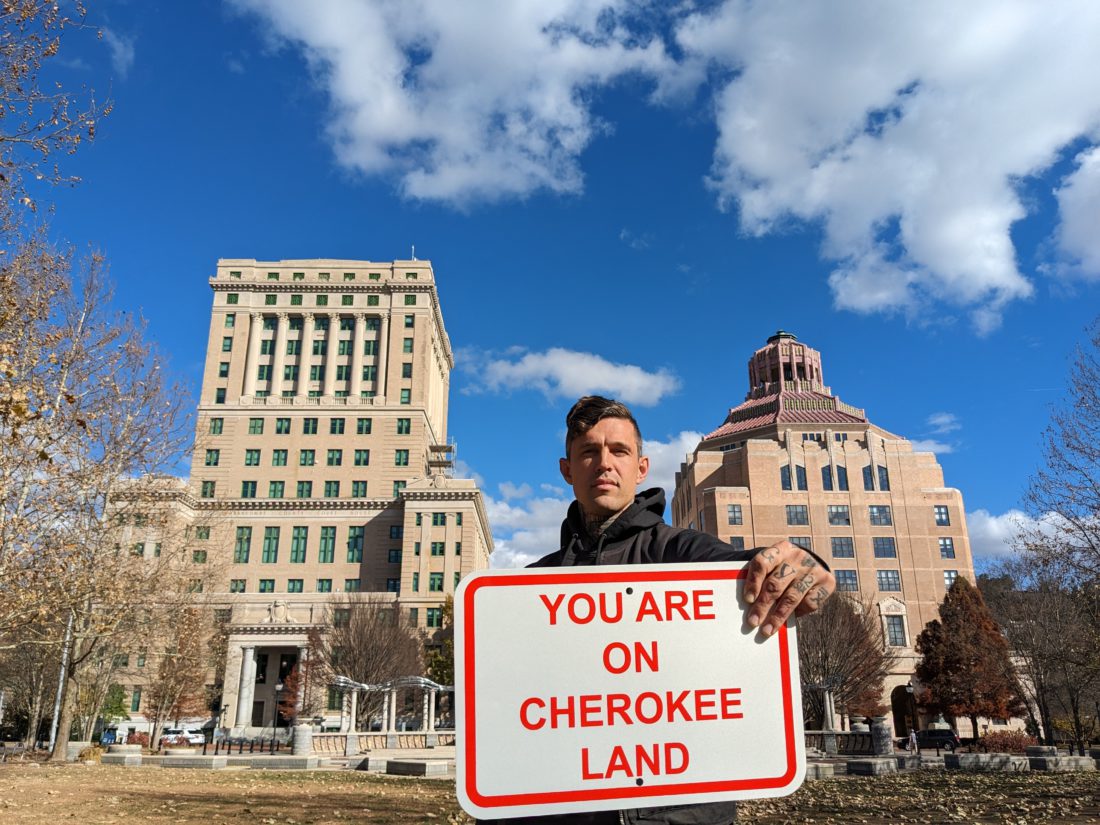Jared Wheatley finds inspiration in some of the most unlikely places.
A dual citizen of the Cherokee Nation and the U.S., the Asheville resident was at Blue Ridge Sign Supply in early fall when he overheard an older gentlemen in front of him place an order for a “No trespassing” sign with an image of a gun on it. Witnessing how serious the fellow customer was about the ownership of his land, Wheatley’s mind went to his own work as founder of the Indigenous Walls Project, which seeks to reclaim visibility, space and social dialogue for Indigenous artists and culture.
“I was like, ‘Hold on here. I want some signs, too,’” Wheatley says.
Store manager Kyle McClanahan, who’s helped Wheatley with various print projects, asked what he’d like on the sign. The concept was immediate, Wheatley recalls. “You are on Cherokee land,” he replied and ordered 30 copies. The exchange, he notes, visibly distressed his fellow customer.
“You could see he was real upset — like, all of the sudden, maybe he was feeling a little bit more aware about the statements he was making about his own property,” says Wheatley, who immediately saw great potential for his new signs. “When you find that inspiration, you do a little something and put it out there to the world — see what the world has to say. And people were real responsive, so then that becomes the move.”
Spreading the word(s)
The fully aluminum signs are made to N.C. Department of Transportation specifications. Individuals or businesses that want to purchase one can send Wheatley a direct message via the Indigenous Walls Project’s Instagram account (@indigenouswallsproject) or buy directly from Horse + Hero art gallery downtown. One hundred dollars pays for two signs.
“One goes to the individual, and then one goes to the wild,” Wheatley says. “That’s what I say because we put these out in Buncombe County and anywhere from Virginia down to North Georgia and beyond.”
Though the sign’s words came to him almost as an epiphany at Blue Ridge Sign Supply, Wheatley feels that the message is an especially powerful one because it presents an indisputable concept that crosses the political divide.
“This is a benign sign,” Wheatley says. “You could consider it almost a baby land acknowledgment. Just recognition — nothing special. No deep history, no big claims.”
Wheatley and individual donors have placed signs around town. Several have been taken down, though he’s not sure by whom or where those signs end up. He says that’s not the case with signs placed farther out in Buncombe County away from the central business district.
“It’s almost strange: If you go to a more conservative area, you might have some kind of prejudice, some thought about what political side would be more supportive of this or that statement for sure,” Wheatley says. “But when you put it up in a more rural area, even if it’s high traffic, it stays up longer.”
While he isn’t certain why the signs have remained untouched in nonurban spots, Wheatley finds their removal in downtown Asheville at odds with the city’s purportedly more progressive ways.
Independent nation
Since there are no markings on the signs that are associated with the Indigenous Walls Project or Wheatley, and therefore aren’t easily restored to him, he says the signs that are taken down “are on their own path.” When the prospect is raised of speaking with local officials to ensure the signs remain up, Wheatley quickly rejects the notion. He notes that the organization’s goals are set through its own lens and reflect what feels good to him as an activist and artist, as well as his communications with Cherokee elders and his family.
“We remain — the natives remain — whether folks really like it or recognize it or not,” Wheatley says. “Personally, it doesn’t seem like the most relevant way, the most authentic way to approach the conversation by me needing to go somewhere and ask them, ‘Please recognize that we remain. Please help us.’”
He notes that different populations speak and communicate in distinct ways, and if everyone’s actions and words are funneled through a white bureaucratic lens, Native people aren’t “functioning to decolonize” or “functioning within our sovereign powers as individuals as Indigenous people.
“I’m Cherokee and think about the Cherokee and talk about the Cherokee,” Wheatley says. “But other Indigenous people exist within the City of Asheville. It’s an intertribal community, so there are many people not being represented or spoken for or communicated with.”
Despite the “acceptable and palatable” nature of stating that one is on Cherokee land, he says the removal of signs placed downtown suggests they’re being viewed through a politicized lens. And when such a “clean” message is taken down and others are left up, it suggests where a community’s values rest, Wheatley says.
“There’s a sign that says ‘Beer City USA’ — we’re real proud of that, but we’re less aware or less proud of our Indigeneity and our connection to the Indigenous people of this land,” Wheatley says. “There’s something in there that doesn’t seem to match up with certain calculations.”
Asheville alliance
Wheatley says he’s more than happy to give signs for free to fellow Indigenous people, such as House of Black Cat Magic President Hannah Soboleski. But he’s also found community support from multiple nonnative local business owners.
“When you make a clean statement, a statement that’s impossible to debate, really, then people will find you. That’s our approach,” he says.
Among these seekers is Terra Marshall, owner of Beauty Parade salon in West Asheville. She follows the Indigenous Walls Project on Instagram, saw Wheatley’s posts about the signs and inquired about purchasing one.
But even before then, she was already thinking about Indigenous history thanks to the Emergence Magazine podcast. Its host, Emmanuel Vaughan-Lee, opens each episode by acknowledging the Coast Miwok, on whose land he records his stories in Marin County, Calif. The statement inspired Marshall to acknowledge where her business resides.
“I am trying to build a more open and inclusive world for the world, my children and future generations,” Marshall says. “My hope is that this sign will help people acknowledge that this is Cherokee land and spark conversation.”
Marshall displays her “You Are on Cherokee Land” sign in the salon window facing Mildred Avenue, next to Gus Cutty’s “Two Queens” mural that features Dolly Parton and RuPaul. She says people frequently visit the mural, so the sign is highly visible in that spot.
Since its installation in early November, the sign has sparked conversation among Marshall and some of what she calls her “close clients.”

“We’ve had talks of the atrocities our ancestors have committed and how we must acknowledge them — how we move forward in teaching our children, friends and neighbors the truth,” she says. “We can’t continue to be fed what we were taught in schools.”
A similar desire for community engagement prompted Emily Quinn, owner of rEvolve Mercantile, to purchase a sign and place it in the front window of her West Asheville used clothing store.
“We’ve had a few discussions with customers about it,” she says. “They usually say they had no idea this land was originally Cherokee land, and then it brings forth the conversation about how the land was ‘secured’ by white settlers.”
Quinn met Wheatley through his mural work and sees the sign as a logical extension of the messages presented through the influx of Indigenous artwork around town.
“I think it’s a cool way to educate and/or remind people that the land they’re on was unjustifiably stolen from Native Americans,” she says. “And that history has tried to smother out the existence of Native Americans, like the Cherokee Tribe, but we have opportunities like this one to uncover the history.”
Along with spreading awareness among Asheville residents, Quinn and Marshall also see great potential in educating the city’s numerous tourists about the area’s roots. In doing so, they additionally hope to foster an enhanced appreciation of why the place these folks are drawn to has such an enduring appeal.
“This land once belonged to a tribe of people who honored its amazing, beautiful nature,” Marshall says. “My goal in supporting this project … is to spark conversation and acknowledge the mistakes of this country’s past. To bring things to light, heal from it and move forward together as a new stronger united generation.”
Wheatley appreciates the support and says that such partnerships give the Indigenous community a stable foundation and “a perceived authority.”
“When those businesses engage us, it states to [City] Council members, it states to the business community, it states to whoever goes in and out of those businesses that they believe in Indigeneity,” he says. “They respect our relationship with this land. They understand that we are the stewards of this land. And that’s what this sign’s really about.”
To learn more, visit avl.mx/bjd.






One thing I have learned in recent years is that Democrats profess to be “tolerant” and value diversity and inclusiveness. However, people who identify as democrats are the most intolerant people I’ve ever met. They simply cannot tolerate someone who has diversity of thought or ideas. They only tolerate people who think, act, and say the things that align with their values. Much to my surprise, the people who identify as Republicans are much more tolerant and accepting of other people – even though they may not agree with them. This is likely the reason that the signs are not being removed in the rural areas – there are more Republicans in the county than in the city.